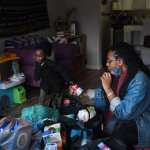This Q&A is in partnership with the International Women’s Media Foundation (IWMF) and its #CheckYourBylines campaign. Like The 19th, IWMF acknowledges that women and LGTBQ+ people are underrepresented in newsrooms — this Q&A is a collaboration in our organizations’ ongoing missions to elevate more diverse perspectives in journalism.
New to The 19th? Subscribe to our newsletter today.
As part of our Spring Member Drive, we delivered The Asterisk, our monthly members-only newsletter, to all 19th readers. In each edition, we go Behind the Asterisk with a 19th team member to give our members an exclusive look inside The 19th. This month, we go Behind the Asterisk with The 19th’s Economy Reporter Chabeli Carrazana, who has been covering the devastating impacts of the pandemic-induced recession since our newsroom launched last August. As the country makes an effort to recover from the economic fallout, Carrazana reflects on her experience reporting on this critical issue.
Sereena Henderson: When we launched in August 2020, your story about America’s first women’s recession was the first story published on 19thnews.org. You have continued reporting on this story ever since. Just last month, you reported on the anniversary of the economic fallout. How have you managed to keep up with this issue that has impacted nearly 2 million women?

The 19th’s Economy Reporter Chabeli Carrazana: This story, for me, has become the story of the past year. And it’s emerged everywhere. It’s in the conversation we were having earlier this year on raising the minimum wage — women dominate the hospitality and service jobs that pay minimum wage, and the losses in that industry drove the women’s recession. They stand to benefit the most from the wage hike. It’s also in the ongoing discourse on child care and the proposals for additional funding in the relief packages — changes to child care could help moms who left work during the women’s recession return to their jobs. It’s in the conversation about paid leave, about unemployment insurance, about training programs for care workers.
So I guess “keeping up” is a good way to put it because there is a lot to keep up with and I try my best to do that. Each month, we also write a story when the new jobs figures are released by the Bureau of Labor Statistics and that’s helped us keep pace with the way the women’s recession has endured. What we know now, more than a year out, is that until the pandemic is contained, the recession can’t end. And as we get there, it’s women of color who continue to be left behind.
As an unprecedented number of women were losing their jobs during the pandemic, you started your work with The 19th — a newsroom that centers women’s voices and stories. What do you have to say about the timing of it all? And what has this journey been like for you — to talk to women and mothers about their hardships during this economic crisis?
When the women’s recession started unfolding, I felt an immense sense of gratitude that we had The 19th. Here, we can give this incredibly important story the focus and attention it needs.
I’m also not blind to the fact that I am incredibly fortunate. I got to start this job at a time when a lot of other people were saying goodbye to their dream jobs, and so I’ve tried to turn that into an opportunity to give back to these women by treating their stories with the utmost care that I can give. I spent hours over several months talking to Emily Way, the woman in our most recent story about moms and the recession. I wanted to understand all the ways she’s thought about her work, but also herself and her identity, during this time. I wanted to be able to help readers understand her as a real person, not just as one part of this larger statistic.
Over the past year of talking to these women, I’ve cried with them, I’ve laughed with them, I’ve shared with them my personal journey and my own fears. I hope I’ve been a good messenger for their stories, but it’s really them who have done the hard work of wading through an impossibly difficult year and then being brave enough to talk about it.
The latest job report found that the unemployment rates for women of color remain high at 8.6 percent for Black women and 7.5 percent for Latinas. Over the course of your reporting, how have you made sure to reflect the voices and experiences of these two groups of women who are often underrepresented in the media?
This is something that has been on my mind with every story. We try to include a diverse set of sources, both in terms of the real people we speak to, but also the experts we tap. I want to talk to experts in their fields who are also drawing on their lived experiences to inform their work.
I also understand that the pressure on Black women and Latinas right now is immense, and sometimes it’s hard to find real people to speak to about their experiences because those people are trying to keep their families afloat right now. They are caring for kids and working extra hours if they can. But just because they may at times be harder to find, doesn’t mean we stop there.
In the recent story on moms and the recession, I really wanted to include the voice of a Black woman or a Latina who could talk about how she was impacted, but we had a hard time finding someone who would chat. My editor agreed with me that the voice of a woman of color needed to be included because the story of this pandemic recession has been one of inequality. So we decided to wait to finish and publish the story until we had that representation in it.
In April, you reported on the Latina wealth gap, explaining how Latinas, already at a financial disadvantage, faced a “triple crisis” during the pandemic: higher COVID-19 infection rates, greater economic losses and increased family-work conflict. You’re Latina. How has this influenced your reporting on an issue that has disproportionately affected Latinas?
Since starting work at The 19th, I have thought more than ever about how my background has helped inform my understanding of the communities we cover. I immigrated to the U.S. from Cuba when I was five years old. I grew up walking to school with my mom because we could only afford one car and my dad took it to work. My mom was a housekeeper when we first moved here, and my grandma was a child care worker. My aunt is a home health aide. Those are all jobs that Latinas are still disproportionately employed in.
And so I have leaned on what I know from the people in my life and the experiences I’ve lived to know where to look and what to ask. I know that as Latinas, the cultural structures of our home countries still inform expectations about who does the majority of the caregiving. I know our communities have been devastated by the virus — my own grandfather died of COVID-19 in January — while many have continued to go into work worrying if they’re next. And I know that all of those things feed into each other and so you can’t write about this year and neglect to mention that race and gender are at the center of that story.
You’ve been covering the economic recovery of women during the pandemic. From a policy perspective, what is one thing that stands out as clear, impactful progress?
I think the most impactful piece of policy to come out of this past year is the expansion of the child tax credit. This is money that parents get each year in their taxes if they have children ($2,000 before this year, now going up to as much as $3,600 for young children).
But for decades, we have failed to make this available to the poorest families in this country, the ones for whom this amount of money would make the biggest difference. Rep. Rosa DeLauro has been fighting for this for 23 years, and she’s picked up Republican allies along the way who have also been interested in expanding this aid.
Finally this year, it passed. It has the potential to benefit more than 60 million children, including half of all Black and Latinx kids and their mothers, who are the most likely to be sole breadwinners. It’s the first time the United States has used direct payments to curb child poverty — something other countries have already been doing — and it’s the kind of aid that could help lift millions of women who are the backbones of their families.
But as of now, the expansion is only for a year. There are proposals for permanent expansion and we will keep a close eye on those as we look at the structural changes that could lift families — and by extension, mothers — in the long-term.



